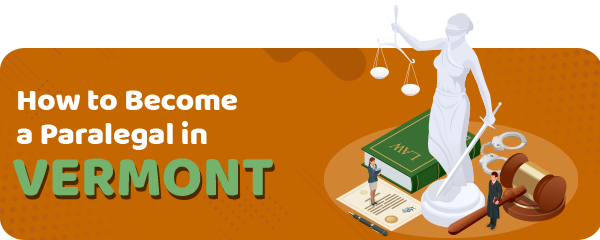Consider being a paralegal if you want a career with room for growth.
Paralegals are a must-have for lawyers as they assist them in carrying out crucial tasks.
These tasks include conducting thorough research on cases, preparing legal documents, and offering legal advice to clients.
Demand for paralegals in Vermont is rising, making now the best time to enroll in a course in the top 5 paralegal schools in Vermont.
But, first, ensure you meet the requirements.
Article Table of Contents
Licensing Requirement to Become a Paralegal in Vermont
Although Vermont has no legal requirement for paralegals in terms of training and education, pursuing paralegal studies in any of the top schools would be nice.
This gives you a better job placement and makes you attractive to employers.
Basic requirements include:
- Over 18 years
- Working experience as a paralegal
- U.S citizen
- Pass criminal and professional background check
- Meet specific educational standards as stipulated by the Vermont Bar Association.
To be certified or gain paralegal licensure, you must complete any of the four national exams:
- The PACE, which is offered by the NFPA (National Federation of Paralegals)
- The PCCE, provided by the NFPA
- The CLA/CP, which is offered by the NALA (National Association of Legal Assistants)
- The PP is offered by the NALS (Association of Legal Professionals)
Top 5 Paralegal Schools in Vermont
1. Burlington College
Burlington College is a private institution that is located near Lake Champlain.
The college is small and focuses on providing students with an environment that integrates learning, personal development, and socialization with the community.
Upon completion, you’ll earn a paralegal certificate.
Cost
If you are studying full-time, you’ll be required to pay $22,860 and $28,500 for part-time students.
If you are taking a bachelor’s degree, the program costs approximately $91,440.
2. Kaplan University
The paralegal program at Kaplan University is designed for students who already have a bachelor’s degree in any course and wish to supplement their legal knowledge or switch careers.
The courses include legal research, legal ethics, critical thinking, communication, and analysis skills.
The program also holds seminars and discussion programs, making for an engaging online program.
Cost
The estimated cost for this program is $13,356.
3. PennFoster College
The paralegal program at Penn Foster College takes place online.
You must be above 17 years old and hold a high school diploma to enroll in this program successfully.
This diploma program takes from 8 to 13 months to finish.
It offers a self-paced learning experience, and the students receive support from the teaching faculty.
The course teaches students how to conduct research and legal writing, investigation, and interviews.
It also covers legal terminology and paralegal ethics.
You will earn a diploma or a paralegal associate degree upon completion.
Cost
Penn Foster has a payment plan for those who can not cover the whole cost at once.
- Full payment: $799
- Monthly auto-pay plan: $989, where you are required to pay $59 every month
- Monthly mail plan: $989
4. Clovis Community College
The paralegal program at Clovis Community college takes place online.
The course focuses on teaching their students a broad perspective on the law in many areas, giving them a chance to explore them before committing to a specific field.
The course has a 66-credit program that can be completed in five semesters.
You must be over 18 and have graduated from high school.
You must also complete an online orientation and assessment to be enrolled.
Cost
For residents of Vermont, tuition is $46 per unit and $258 for out-of-state residents.
5. James Madison University
James Madison University’s paralegal program is ideal for people who want to work as legal assistants.
The program takes 5 months to finish and takes place in the evening from 6.30 pm – 8.30 pm.
This certificate program takes place online and offers students theoretical and practical sides of the law.
With this program, you will understand the legal procedures & ethics and enhance your communication & writing skills.
If you want to be a certified paralegal, you can take the paralegal exams from formal organizations, such as NALA or NFPA.
Cost
The paralegal program at James Madison University is approximately $3,995.
Note: Very few schools in Vermont offer physical paralegal classes, as most do it virtually.
Besides, online classes are the best bet if you work a 9-5 and want to switch careers.
Paralegal Schools in Vermont – Summary Table
| School Name | Address |
|---|---|
| Burlington College | 351 North Ave, Burlington, VT 05401 |
| Kaplan University | 1801 E Kimberly Rd, Davenport, IA |
| PennFoster College | 14300 N. Northsight Blvd. Suite 125. Scottsdale, AZ |
| Clovis Community College | 10309 N Willow Ave, Fresno, CA 93730 |
| James Madison University | 800 S Main St, Harrisonburg, VA 22807 |
Salary Expectations
An entry-level paralegal in Vermont makes about $52,240 annually, but the amount varies from city to city.
Annual Salary Range:| Location | Avg. Annual Salary |
|---|---|
| Burlington | $59,227 |
| Essex | $59,227 |
| Rutland | $59,760 |
| Colchester | $59,227 |
| South Burlington | $59,227 |
| Bennington | $60,788 |
| Brattleboro | $60,972 |
| Hartford | $61,652 |
| Milton | $59,191 |
| Barre | $58,686 |
Regional Salary in Vermont
| Region | Employed | Avg. Annual Salary | Avg. Hourly Pay | Top 10% Annual Salary | Bottom 10% Annual Salary |
|---|---|---|---|---|---|
| Burlington-South Burlington, VT | 270 | $63,210 | $30.39 | $77,210 | $47,620 |
* Employment conditions in your area may vary.
Frequently Asked Questions
Which are the best paralegal organizations to join in Vermont?
- Vermont Bar Association
- Vermont Legal Aid
- Vermont Paralegal Organization
What are the requirements of being a member of the Vermont Bar association?
- Bachelor’s degree, completing a paralegal course, and spent six months working as a paralegal in training.
- Associate degree, completing a paralegal program, and one year working as a paralegal in training
- Associate degree in paralegal studies and one year working as a paralegal in training, or
- Bachelor’s degree in any field and one year working as a paralegal in training. Or
- Bachelor’s degree in any field and two years working as a paralegal in training
- High school diploma, completed a paralegal program, and two years working as a paralegal in training
- High school diploma and four years working as a paralegal in training
How do you get certified as a paralegal in Vermont?
Although certification is not a must in Vermont, it would be nice to have one.
You can get certified through the NFPA (National Federation of Paralegal Association, which offers two certifications, PCCE and pace, attainable after passing the relevant exams.
Read the full guide: How to Become a Paralegal






Internships and externships are invaluable for gaining practical experience. Look for law firms, corporate legal departments, or government agencies in the place.
Stay up-to-date with Vermont’s legal landscape by regularly reading local legal publications and attending continuing education seminars.